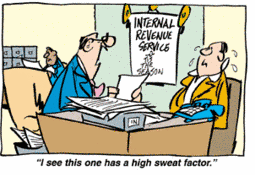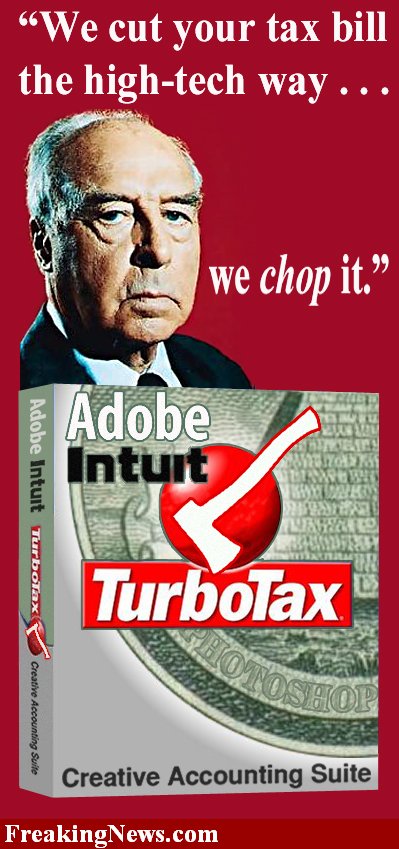Planning Ahead
This email exchange was from early August.
Q-1:
Subject: 2005-1040
Kerry,I have doing some tax planning and have been trying to find out what amounts that the IRS will use for tax year 2005 for standard deductions and exceptions. The only place I could find what I was looking for was on your website, which I am a bit skeptical about. One reason for my skepticism is you show "Updated Tuesday February 01." I doubt that the IRS would have known what those numbers would be last Feb. It shows the 10% bracket extended to $14,600 which was surprising, as I didn't know it was indexed to inflation, and if it were would indicate an inflation rate of 4.3%.
A-1:
The current update date showing up on that page is just the last date I made any modifications to that page. My FrontPage program automatically inserts the date whenever I change anything.
The info on that page was actually posted on 9/23/04, as mentioned in this blog post.
Thousands of people have linked to my page with the 2005 rates since I posted it on 9/24/04 and you are the very first to express any doubt as to its accuracy.
You can see the same info on the 2005 1040-ES form.
What may have you confused is the fact that when things like the standard deduction are adjusted for inflation, that can only be done in increments of $50, which does often give us a little more bump up than the actual change in the CPI.
I hope this clears up your confusion.
Kerry Kerstetter
Q-2:
Kerry,Thank you for your prompt response. My skepticism was in part because I tried to Google that information up and hit a dead end everywhere but for your website. I thought if this information were valid that I would have likely also found it somewhere else.The reason for my wanting to know this is for tax planning purposes. A couple of years ago I made what for me was a surprising discovery. Going through the 18-page worksheet to determine how much of my S/S was taxable was not difficult but I could not understand just what it was that they were doing to me. In order to help comprehend what was going on I put together a spreadsheet increasing taxable income (line 3) $1,000 per column and the results was surprising.As an accountant you may be aware of what follows, if so I have wasted my time but if not I think you would be interested in this.I knew that when they started taxing S/S that you are taxed on $1.50 for every extra $1.00 of income. What I did not realize was that this also effectively caused a narrowing of the 10% bracket. Suppose the bracket is $14K wide and you start pay taxes on S/S after using $8K worth. You only have $4K of the 10% bracket left as the taxing S/S effectively narrows the bracket by $2K.When S/S begins being taxed your effective marginal rate (EMR) is 15%, (10% of $1.50). Once you get to the 15% bracket, your EMR is 22.5% (15% of $1.50). If you reach the trip point where $1.85 is taxed for every $1.00 of income you EMR is 27.75% (15% of $1.85). After 85% of you S/S is taxed you go back to 15%.I realize that knowing this is of no use to most people but I find myself in a unique situation where I think I can use this to my benefit or the benefit of my heirs. Instead of minimizing current taxes I am trying to optimize taxes for the longer term. As I receive a non-taxable disability benefit from the VA we have adequate income without paying any income taxes. I have about $500K in regular IRAs and as I am not yet required to take minimum distributions I think it is to my benefit to move regular IRA money to a Roth. I feel that if I don't move those assets now it is likely to cause me or my heirs to pay more taxes later on. I feel that at a minimum I should move enough money to use up the 10% bracket. However I am less sure that I am on the right track doing what I am doing, which is to have a target income that just avoids the EMR of 22.5%.I did read your letter opining that Roths will likely be taxed in the future and I fully realize that tax planning is often futile because of the fickle ways of Washington.
You certainly do a lot of number crunching to work with that nefarious penalty on "evil rich" SS recipients. You are absolutely right that the effective marginal tax rates are frequently higher than those in the official IRS schedules because of the things triggered by AGI, such as credit and deduction phase-outs, as well as the taxability of SS.
Converting conventional IRAs to Roths would compound these ripple effects for the years in which you report the income on the conversion. Whether the tax hit now will be worth it down the road is a bit of a guessing game. However, I do still have serious doubts that our rulers will leave the tax free status of Roths intact for those they consider to be evil rich. I hope I'm wrong; but you are already experiencing the effects of the exact same kind of promise-breaking with taxes on your SS.
I hope you have set up a computerized worksheet for these calculations because this would be a lot of work by hand.
Good luck.
Kerry
Q-3:
Kerry,
I spent quite a bit of time laboring over this spreadsheet and now the number crunching is all done automatically. I imagine it would have been pretty easy for someone that is fluent in Excel but I am kind of a self-taught klutz so it was slow going for me. The first 18 lines mimic the 18-line worksheet in instructions for 1040. The added lines compute your EMR and the dollar amount of taxable income that triggers the change in EMRs. Anyone can use it by inputting the dollar amounts into those cells shown in red to reflect their personal situation.
A-3:
Thanks for sharing that Excel worksheet. That is a very interesting approach to looking at the effective tax rate on your SS benefits.
I hope you've seen the 2006 tax rate schedules which I have posted on my website.
Kerry
Scary Halloween Sayings

Number Six - "Your future Social Security check depends on us landing high-paying jobs" - wouldn't be so scary if we were ever allowed to drop out of the current Ponzi Scheme arrangement and set aside our own money for our retirement.
38 New TaxMan Songs
For the many people who appreciated the live version of Nickel Creek's rendition of George Harrison’s classic TaxMan song that I posted a few months back, I have found the Mother Lode.
Being so far in the boonies, I'm not able to make it in person to many live concerts. However, many artists are willing to have their performances taped and shared with fans for free. For the past several months. I have been downloading concerts from the Live Music Archive and playing them through my computer and office surround sound system while I work.
A few weeks ago, I noticed the search function, which I had previously thought was only for finding bands, and typed in "TaxMan." It came up with 38 hits, many by groups I had never even heard of. Over the past few days, I have finally been able to download all 38 to my main computer.
The cuts each range from a little over three minutes to almost 16 minutes in length. Altogether, they total almost four and a half hours if you stack them up and play them back to back, which I am doing right now.
As you can see by the list below, there are several versions by the same groups. However, that doesn’t mean they sound the same. The reason these groups allow their concerts to be taped and shared is the fact that most of them are of the jam-band ilk, where no two performances are done the same way. They are the complete opposite from the more famous pop stars of today, who charge their fans huge sums of money to see them lip-synch to their studio recordings while dancing around the stage. The jam-bands, most famously represented by the Grateful Dead, make each performance completely unique, and thus encourage their fans to capture them for posterity.
As with all of the concerts on the Live Music Archive, some give you a choice of formats to download, including MP3 with the smallest file size, while others only have the much larger SHN format, which music purists claim is of higher quality. I haven't noticed much difference in quality, so I choose the MP3 when given the chance. SHN files can be played with the free WinAmp program.
The 38 songs that came up in the search are by:
String Cheese Incident - 13
Steve Kimock - 1
The Green Onions - 1
Moonshine Still - 4
Mutual Admiration Society - 12
Bockman's Euphio - 3
Virginia Coalition - 1
Myoclonic Jerk - 1
Ruder Than You - 1
Go There - 1 (Instrumental)
These music files are legal to download and use for your own personal non-commercial entertainment.
Four Key Factors to Consider When Hiring a Listing Real Estate Broker – Some good ideas for finding someone who is competent to help you sell your type of property.
Small-Business Owners Aren't Saving Enough – I’ve never been a big fan of saving lots of cash or considering anyone who doesn’t to be unprepared for retirement if they have instead used that money to invest in their business or in quality assets, such as real estate. Selling off one’s business for either cash or monthly payments can produce much more retirement income than any cash type savings. Ditto for real estate.
Official IRS Inflation Adjustments For 2006
For those who have been hesitant to rely on the computations by outsiders as to the 2006 Federal tax rate schedules and other things that are adjusted annually for inflation, IRS has released its official calculations. As this announcement mentions, the annual gift tax exclusion will be raised to $12,000 as of 2006, just as predicted by the wizards at CCH a month and a half ago.
Full IRS schedule – 19 pages pdf
Bush Eyeing Low Tax 'Legacy' – Excellent goal. It’s too bad that his other legacy has already been cemented as the highest and most reckless spending president ever in the history of our country. Refusing to veto any of the out of control spending bills from Congress makes him just as guilty in violating his fiduciary responsibilities in regard to the taxpayers' money.
IRS Discussing Early Concept of Information Return Clearinghouse – Having one big central location for everyone’s tax records couldn’t ever go bad, right? Doesn’t anyone recall all of the other big IRS screw-ups when it came to computer technology and guarding information confidentiality?
Schwarzenegger Nixes Tax Enforcement Bills – Protecting the people against increasing the already Gestapo-like powers of the PRC tax collectors.
Taking Cash Out: Paying for Children’s College Education – Some good ideas from the most recent Intuit newsletter.
Nearly Half of Owners Plan to Not Stop Working – This shouldn’t surprise anyone who understands the fundamental differences in work ethics between those who are brave enough to be self employed and the W-2 wage slaves who prefer to rely on others for their income.
Competition For QuickBooks
For several years now, QuickBooks has been the most widely used accounting program for small businesses; and deservedly so, as I often describe. Failing in their attempt to buy up Intuit a number of years back, Bill Gates and his gang in Redmond are going after the QuickBooks market with their own Small Business Accounting program, and trying to sign up professional accountants for its version of the QuickBooks ProAdvisor program.
Microsoft sent me a couple of copies of their 2006 program a few weeks ago, but I haven’t had time to play with it yet. I will try to keep an open mind when doing so, but I find it hard to believe that their first year program can compare to one that has been around for 13 years. I wasn’t even a big fan of QuickBooks for the first few years and was advising people to use Quicken instead. With the excellent improvements in QuickBooks over the years, it is now the opposite.
Intuit is addressing their new competition with this comparison between its program and the upstart from Microsoft.
Intuit says that they will be shipping out the QuickBooks 2006 programs to us ProAdvisors in the week of November 7. I will pass along anything important I notice when working with it.
Confusion Over S Corps
These are all from an email exchange with the same person this past August.
Q-1:
Subject: re: scorp
hi,do you know if i can retroactively go from a c -corp to an s-corp more that on year for example a c corp was formed in 2002 can i go back to an s- corp from 2003??Thanks
A-1:
Your question is a bit confusing; so I'll tackle a couple of possibilities.
You can't switch back and forth between C and S corp status from year to year. After revoking an S election, you may not reinstate it for at least five years.
If you are now, in 2005, wanting to file for an S election for 2003, it will be extremely difficult unless you have a very good reason to convince IRS to honor such a very late request on Form 2553.
As always, you should be working with a tax pro who understands both C and S corps, and not trying this kind of thing on your own.
Good luck.
Kerry Kerstetter
Q-2:
Subject: Re: s corphi,My question is, can money have been legally collected (prior existing agreement) as an agent for the corp. he is collecting as a private collection agent for the corporation. The money was deposited into the collection agents personal account.This money was used to pay corporate bills-as per the agreement between the corporation and said collection agent.If above is true , than corporation will be claiming said income and expenses on corporate return.Note-The collection agent is the only shareholder of said corporation.alls money paid had a 1099 issued to the collection agent personally. my question is there any legal way for the corporation to end up with income and expenses??Thanks alot.
A-2:
I have some info on how to handle this kind of thing on my website.
You and your personal professional tax advisor should work out the best approach for your circumstances.
Kerry Kerstetter
Q-3:
Thanks for the quick response, do you know if it is legal to take in money this way? (were he is collecting money for the company he is working as a collection agent for the company and the collection checks are made out to him personally? thanks for explaining how to disburse it but can he take the money in this way ? again thanks for your help...
A-3:
From a legality perspective, there are several areas that need to be considered.
As a CPA, I can only address the issue of income taxes. If all monies received and paid our are properly reported to the IRS and State tax agency, that should be okay.
From the regulatory side, in regard to Federal and State laws over collection agencies, you will need to check with the applicable agencies or consult with an attorney who works in this area.
In regard to yourself and the company for which you are making collections, as long as they receive what they are entitled to under your services agreement, and they don't have any problem with the money coming through your account, there shouldn't be any problem there.
Kerry Kerstetter
Investors can avoid 'stupid is as stupid does' defense – Some excellent tips, especially when working with commission based advisors who love to churn accounts – something I see far too often.
South Carolina Man Allegedly Sells Fraudulent "Untaxing Packet" Nationwide
How a Small Biz Can Get No-Cost Expert Advice – SCORE is a very handy free resource.
1031 and Rental Property
This is also from March 2005:
Q-1:
Subject: Exchange QuestionI just ran across your site and found it very interesting. I was wondering if you could help us with this question. My husband and I purchased a home in 1987. We lived there until 1994. We are a military family and have been stationed away from this home ever since. It has been rented from 1994 until now. We plan to sell it. It is in Florida. We plan to move to Branson, Missouri. We were wondering if we could reinvest in a small hotel type business, for example 10 rooms or a B&B type business and or a 4-plex. We would wish to live in the business. We would like to use the proceeds to pay off existing mortgage, car, and college loans, while financing the business with a modest down payment. Is any of this possible without paying huge chunks of taxes?Thank you for your advice.Sincerely,
A-1:
To have a valid tax deferred exchange, you will need to reinvest all of the cash proceeds from the disposal of your Florida rental property into new like kind property, which could be a hotel type property in Branson, as long as enough of that purchase price is allocated to the real property portion of the property to meet or exceed the selling price of the Florida property.
Any portion of the new property that will be used as your primary residence cannot be counted.
No part of the cash proceeds can be used for non-reinvestment things, such as paying off other debts that are not secured by the Florida rental. It is possible, after you have taken title to the Branson property, to refinance it and use the new loan proceeds to pay off other debts without any tax consequences.
You really need to consult with a tax pro to work out the best strategy for your plans and circumstances.
Good luck.
Kerry Kerstetter
Q-2:
Kerry,Thank you so much for your advice. Since it appears that we have to move in this direction, we were wondering about buying another house for rental purposes. We plan to sell our home in Florida for a net of $167,000. We are looking at houses in the Branson area and are considering purchasing one and paying cash in the neighborhood of $120,000 and then purchasing a small hotel/live in business with the remainder of the proceeds acting as the down payment for the investment. This would be making an exchange with two properties in mind. Is this possible? If so of the $167,000, $120,000 goes to pay in full for rental property with a remainder of 47,000 or so toward the purchase of the hotel units. Since the hotel that we are looking at is around $215,000, there is no way to pay for this business in full, but we would rest easy knowing at least one property is completely paid in full and with the opportunity to bring in income.
Another question is, can you count closing costs in the transactions of the $167,000 or must the entire amount go into the properties themselves? And am I understanding what I've read on the internet correct in that we need an Accommodator for these transactions? If so, which would be best, to obtain one from Florida where we are selling or from Branson, where we are moving?I know I have a lot of questions and I do so appreciate your time. Thank you so much.Sincerely,
A-2:
You have me a bit confused here. Is the home you are planning to sell for $167,000 your primary residence or a rental?
If it's your primary personal residence, there is no replacement requirement. You can see all of the rules on my website.
Kerry Kerstetter
Q-3:
Kerry,This house which was our primary residence for seven years,(due to military orders), became a rental property and has been for the last 10 years.
Thanks again for the help.
A-3:
Thanks for the clarification. Terminology is critical; so describing it as "our home" muddies the issue tremendously.
After ten years as a rental, it long ceased to be your primary residence and a 1031 exchange would be necessary to avoid any taxation of the profit you will be having.
Another ambiguous term that you used is "net of $167,000." If you are referring to the cash after paying off existing loans, you are off track. The requirement for a completely tax free exchange is the net sale price after deducting the direct selling costs, such as commissions and escrow fees. Payments of loans and operating costs, such as interest and property taxes, do not lower the target replacement price.
That said, the answer to your original question about using the proceeds to acquire two replacement properties is yes. That is quite common. As long as the total combined cost of the new properties meets or exceeds the net sale price of the old property, you are covered. The only thing you would need to be concerned with is that you can't count the cost of the property in which you will be living as suitable like kind. This means that you will need to allocate the purchase price of that property between the business portion and the primary residence portion to see if you are reinvesting an adequate amount.
You can count the closing costs on the acquisition legs as part of the reinvestment. Anything that would normally be capitalized as part of the property cost qualifies.
You do need to use an exchange accommodator to hold the proceeds and prepare the proper documentation for all legs of the exchange. If you touch any of the money yourself, even for a split second, you will be taxed on it, even if you do apply it to the new property.
You can use an accommodator anywhere in the country. It really doesn't matter. For example, most of the exchanges my wife's company, Tax Free Exchange Corporation, handle are not even close to Arkansas, and are between states all over the country.
Good luck. I hope this helps.
Kerry Kerstetter
Q-4:
Thanks Kerry for all the valuable information. Before we clicked on your site, we were clueless about what all was involved in selling and reinvesting. My husband is retiring from the military and we are leaving Germany is a few weeks and are really looking forward to getting involved in the business side of things. Thanks so much for your help.
Labels: 1031
Sec. 179 For LLC Members
I have a large number of items in my “To Be Posted” folder. This was from March 2005.
Q-1:
Subject: Section 179 as an LLC PartnerDear Ms. Kerstetter,Nobody can seem to answer my question. I am an equal partner of a 3 member LLC (taxed as a partnership). I purchased a large SUV (over 6000 lbs) in August, 2004. I made this purchase with my own money primarily for my business activities on a daily basis, but figured it would be a good vehicle to have for certain personal usage (family vacation). My question is this:Can I deduct the 84% usage on this vehicle as a Section 179 deduction? If so, where do I make this deduction (what form)? Do I simply adjust line 17 on the 1040 or must I make this deduction on another line?Any help would be greatly appreciated,
A-1:
Unreimbursed expenses that you pay on behalf of your LLC, including Section 179 and other vehicle costs, can be claimed on Page 2 of Schedule E on a line right under where the LLC K-1 info is shown.
This has long been a very basic part of tax return preparation. If your personal tax advisor was unaware of this, it may be time to look for someone with a better understanding of how to handle pass-through entities.
I hope this helps. Good luck.
Kerry Kerstetter
Q-2:
Thank you very much Kerry for your answer. I assume you were referring to Schedule E, Page 2, Line 28 (i) under Section 179 expense deduction from Form 4562. So even though I would list my LLC's name, I would go ahead and list the K-1 info as well as my own section 179 deduction on the same line? That's where the confusion lies and why no tax preparer (and I've asked plenty) here can seem to give me a straight answer. Some say that Unreimbursed expenses must fall under the condition: To be deductible, the partnership agreement must state in writing that the partner pay the expenses.The problem is that I purchased this Large SUV at my own discretion, as I felt it would make my job easier as well as come in handy for the rare trips my wife and I make. Under these conditions, can I still claim this, even if it's not in the partnership agreement?
Thank you so much for helping me out,
A-2:
I'm not sure why this is so confusing to tax pros. For as long as I can remember, my tax software has had an option to code business expenses, including depreciation and Section 179, to a K-1 activity. It then prepares the appropriate backup schedules, including the 4562 for depreciation and Sec. 179, and prints the total on page 2 of the Sch. E, on a separate line under the info from the K-1.
You don't have to put everything on the same line. As I mentioned in an earlier post on my blog, if there are more K-1s than blank lines on the Sch. E, the program prints "See Attached" and has a backup schedule listing all of the individual K-1 and expense items. I have had clients with 30 or 40 K-1s, so such backup lists are quite common.
IRS has never had any problems with reporting it like this, and I have prepared thousands of them.
Kerry Kerstetter
Q-3:
I just got back from visiting with another CPA. She also said that anything declared as a Section 179 on the Schedule E must come from a K-1. How can I do this if I purchased my SUV with my own money. All I want to do is deduct 84% of the cost of my SUV, since that is what I use for business. If I list it on line B, of Schedule E, Page2, line 28, What do I put as the name of that Section 179 deduction since I have no sole proprietorship or other business that made the SUV purchase for me? Please help. Do you do taxes for people in Nevada?Thanks Again,
A-3:
As I said before, my tax software has always allowed me to show Section 179 property purchased by individuals for partnership & LLC business on Page 2 of Sch. E; and IRS has never complained; so I'm not sure why that CPA said that. She probably just didn't try it.
If you're doing your return by hand, I guess you could include the 4562 and carry the numbers to page 2 of Sch. E. Write in that they were for the LLC activity.
We do have clients all over the country, including several in the Vegas area. Unfortunately, we are over-extended and are dropping clients in order to balance out the workload with my capacity.
Kerry Kerstetter
Q-4:
Kerry,Thank you so much for all your help and responses in this matter. You're doing a very nice thing in taking time out of your busy schedule to help out people such as myself. I actually found a tax preparer today who suggested that I can use Form C and just not enter the business name, just in order to get the software to list my Section 179 deduction under my K-1 info. This way, it will decrease my adjusted gross income like it should. However, I'm gonna suggest your way better, as I know that the Section C is only for Sole Proprietorships. I guess in a way, it's the same thing. I still wish you could do my taxes over the phone, as I have already done everything else. The only thing I needed was to complete that Section 179 writeoff. A whole lot of preparers here in Vegas could learn from you. Anyhow, I'll have that prepare do it for me just to give me some peace of mind, as I want it done via a tax program rather than by hand.
Again, thank you so much for all your help. My wife and I are very grateful to you.
Regards,
A-4:
That Schedule C idea is dangerous. I recently finished resolving an IRS audit case for a client whose original preparer did just that, putting her personally paid K-1 expenses on Sch. C instead of on Page 2 of the Sch. E.
Good luck.
Kerry
Labels: 179
To the cyber scammers in Nigeria who trawl for victims on the Internet, Americans are easy targets. – Amazingly, people still fall for these scams that have been going on for decades.
Tax Credits for Driving 'Green' – From Gail Buckner.
Senate's Treasury Bill Would Bar IRS From Creating Tax Prep Software – Who in their right mind would actually trust IRS software to help them minimize their taxes? Can anyone say “conflict of interest?”
The Costs of Buying Real Estate In Mexico – A short look at some of the aspects of US citizens buying property down there. One point not covered, for anyone considering using 1031 exchanges with Mexican property, is the fact that the tax code defines “like kind” in regard to real property in terms of its nationality. USA real property can be exchanged for other USA real property. Mexican real property can be exchanged for other Mexican real property. You can’t use 1031 to swap between Mexican and USA properties in either direction.
Here is the website of Julie Kershner, the Realtor quoted in the WSJ Q&A who has a lot more info on Mexican real estate.
Labels: 1031
Documenting Expenses
Q:
Subject: Online Bill Payment and the IRSMr. Kerstetter-
Came across the following statement in an article in the NYT about online bill pay.
"As long as I see that I.R.S. wants a canceled check as proof of payment, I will recommend that people who want to deduct their personal or business expenses pay them by check," advised Eva Rosenberg, publisher of TaxMama.com.
Your thoughts?
Keep fighting the good fight-
A:
I do agree that cancelled checks are the best way to document expenditures. That is why I have long had battles and refused to work with banks that don't return the actual checks. I have explained to them that the little pictures of the check-fronts often aren't good enough. This is especially true when trying to track down how IRS applied a tax payment, a frequent problem. The tiny tracking numbers are on the backs of the checks.
This is why I have gladly paid my bank (Regions) an extra two dollars each month so they will include my actual canceled checks along with my monthly bank statement. Many other banks refuse to even make that available, claiming that it's for the customers' convenience, when we all know that it's strictly for theirs.
You can use credit card statements to prove expenses, but you will also have to have a receipt showing the details behind it in order to prove to IRS auditors that it wasn't a personal expenditure. Eva had an excellent point in the article about not wanting to allow IRS examiners a peek at other things on the credit card statement. Auditors are notorious for snooping around in things that have nothing to do with the actual examination in a fishing expedition for other items they can hassle the taxpayer about.
Thanks for passing that along.
Kerry Kerstetter
Are Gifts Taxable?
Q:
Subject: Penna Question
When as a recipient of a gift from the death of a friend, do we as the recipient pay tax on it?Also is this added into our income? (State or Federal or Local)
http://www.taxguru.org/estate/706.htm
I have read your site, but it talks to more of the donor than the receiver.
Thanks
A:
You first need to be clear about your terminology. A gift is something you receive from another person while s/he is alive. An inheritance is something received after the person passes away.
There are very few things that are not subject to income tax on the recipient. Gifts and most kinds of inheritances are two of them. The only potential tax, if the gifts or bequests are large enough, are on the former owner of the item being transferred.
The most common kind of inheritance that would cause income tax obligations for you as the recipient would be of something like a pre-tax retirement account. If you were named beneficiary of someone's IRA or other kind of tax deferred account, you will probably have to pick that up as taxable income. In that case, you should definitely work with a professional tax advisor to see what can be done to limit your tax hit.
If what you received wasn't from a retirement account, there should be no income or other tax for you to worry about. You are not even required to report it on your income tax returns. However, I often do disclose large gifts and inheritances on a statement with tax returns where it would explain why certain deductions, such as charitable donations, are much larger than would normally be expected for someone with a certain sized taxable income.
I hope this helps. A tax pro can help work with your particular situation.
Kerry Kerstetter
Sales Receipts
Perhaps others are as confused as Mike Straka is in regard to why so many sales clerks hand out receipts:
Just keep the receipt, please.
I really don't need it. I don't need the coffee receipt. I don't want the sandwich receipt. I don't want a receipt unless I ask for it.
Why do some stores insist on giving you a receipt even when you don't want it?
Many even go so far as to post signs reading: "If we don't give you a receipt your purchase is free," or "$5 if we don't give you a receipt." Wow, that's great. But when I buy my $1.51 cup of coffee every morning (it's NYC, after all), I don't necessarily want the receipt.
I sent the following to Mr. Straka:
Mike:
As a former auditor who has helped set up internal controls at companies to reduce the risk of employee theft, I smile each time I see one of those signs promising something free if the clerk doesn't give us customers a receipt because I know exactly what it's for.
As you may or may not know, businesses lose much more money from employee theft than from shop-lifters. A popular technique of stealing is to pocket the customers' payments and not ring them up on the cash register, which is checked and balanced with the money in the till and the bank deposits. A store owner can't be watching every sales transaction to see that all of the money makes it into the till, so they enlist the customers as their "deputies" to ride herd on the clerks.
This is a similar trick to the request that you write the amount you are sending in with payment coupons for such things as credit cards. This is meant as a way of preventing the employees who open the mail from changing the amount posted as having been received.
I hope this helps you understand the reasoning behind the requirement to give out receipts If you ever open a little shop of your own and rely on minimum wage employees, you will be wanting that as a minimum in order to prevent them from augmenting their pay on their own.
Kerry Kerstetter
MBA~CPA~ATP~ATA
Osage, Arkansas
Tax Favored Treatment for Early Distributions from IRAs and other Retirement Plans for Victims of Hurricane Katrina – Courtesy of IRS.
Life Cycle of a Private Foundation – Courtesy of IRS.
Builders vow to save home loan tax break – We won’t lose the mortgage interest deduction without a fight
Tax & Fleece
Check out Jay Dyson’s scary Halloween image of what only New York voters can stop for us.
You Did What With an IRA? – Self directed IRAs have a lot of possibilities; but shouldn’t be used for hugely risky investments.
2006 Gifting Limit
Q:
Subject: Annual Gift Exclusion
Hello Kerry -I read on your website that the annual gift exclusion will increase to $12,000 in 2006, but I was unable to verify that elsewhere. Would you mind sharing your source for that information? We want to make sure the information is solid before using it in our planning models.Thanks very much -
A:
That came from the same source as the 2006 Federal income tax rates that I posted on my site, CCH.
Gift Tax Annual ExemptionThe gift tax annual exemption, which increased by $1,000, to $11,000 in 2002 for the first time since it was indexed for inflation in 1997, will increase to $12,000 for 2006. Pursuant to the IRC, the exemption can rise only when the inflation adjustment would produce an increase of $1,000 or more.
Kerry Kerstetter
Follow-Up:
Kerry -Thank you for the fast response. It looks like this is still a CCH projection, but I'm guessing that's fairly reliable.
Thanks again -
Online Retailer Skips Sales Tax? You Might Sue – I have noticed more and more that online orders are having sales tax added on. With vigilantes like this guy, sales tax free purchases will soon be completely a thing of the past.
Two Danville, California Doctors Arrested For Tax Evasion – The fact that I spent the first 21 years of my life in that town made this headline stand out for me. I never knew these father and son doctors who used a scheme with phony invoices and offshore accounts to defraud the income tax collectors; but they are going to pay a steep price for not using the many legitimate methods available for reducing their taxes.
Virginia Return Preparer Used the Bogus “Claim of Right” Doctrine – And now the Feds have busted him, and his retarded clients will be looking at some huge tax and penalty bills.
The Swamp Known as Tax Reform – A good time to remind everyone what tax reform efforts always result in.
The president's tax-reform panel may propose reducing the mortgage interest deduction and capital-gains exemption – If anything would cause the real estate bubble to burst, this would do it big-time. Reducing the acquisition debt ceiling from one million dollars to $350,000 would put a huge brake on home values. Let’s hope there are enough forward thinking rulers in DC to recognize this before they pass such an irresponsible reduction.

When `Harvesting' Tax Losses, How Little We Glean – When looking at large capital gains, a review of potential losses that can be claimed is a wise move.
Discount Real-Estate Brokers Spark a War Over Commissions
Home Sellers Use Blogs To Market Their Properties – I passed this along to my dad, who may want to try it to sell his home in Rogers, Arkansas.
Toil in the Soil: Running A Garden-Related Biz – Excellent tax saving opportunities, as well as a perfect thing to do from a place like ours.
High-Deductible Health Plans Join the Mix – Another look at HSAs.
Big Car, Big Tax Credit – New rates for buying hybrids.
USA Tax Work By Indians
I have written a lot about the continuing trend for tax preparation offices to farm out the actual work to less expensive firms in India.
Ohio CPA Dana Stahl, who told me he explicitly notifies his clients that all of their tax work is done in his offices here in the USA, recently sent me this:
Subject: Myths of Outsourcing-FYIMr Guru - another viewpoint on outsourcing. Haven't changed my own prospective, but interesting nonetheless.
DS, CPA
My Reply:
Dana:
That's not exactly an unbiased source on outsourcing, considering that his company has been aggressively soliciting business to have their Indian staff prepare tax returns for USA accounting firms. I still think it's a stupid idea in regard to properly serving clients.
Kerry
It’s not just tax preparation work that is being outsourced to India, according to this post from TaxProf Paul Caron. For just $15 an hour, this company in India will perform USA Federal tax and other legal research. They have been soliciting work from law professors, and I’m sure will soon be making similar pitches to us in the private practitioner community.
SE Tax For LLCs
Q:
Subject: LLC and SECA
Kerry:What I've always told my clients is that an LLC is a disregarded entity for tax purposes. Therefore, a single-member LLC is taxed as a sole proprietorship (SECA-liable), and a multiple member LLC is taxed as a partnership (SECA-liable on net profits from business).The only way that an LLC can avoid SECA is to do an entity election change and be treated as a corporation or an S-corporation. Even there, the "reasonable salary" (with FICA) requirements of the S-corp tangle you up. On the C-corp side, you have the issue of dual-entity (LLC and individual) taxation.As far as I know, this is mainstream tax advice. Anything I'm missing?
A:
It isn't as open and closed as you may think. For LLCs that are reported on 1065s, there has long been a dispute as to whether or not the K-1 income is subject to SE tax.
I don't have time to list the full history of this issue; but I will give a short summary. If you have the 2004 Small Business QuickFinder Handbook, there is a very good recap of the historical development of this controversy on page F-3.
Basically, there are some people who believe LLC members should be taxed the same as general partners of a regular partnership; with the net income subject to SE tax. Other folks believe that LLC members should be treated like limited partners in a normal partnership; with no SE tax on the net K-1income.
IRS issued a proposed regulation in 1997 requiring SE tax for any member who was active in the LLC business for more than 500 hours during the year. This has never been made official, which has given us the current status of having SE tax optional on LLC members.
There are currently some practitioners who are taking the approach of subjecting net income to SE tax for those members who actively participate in the business, while exempting the net income from SE tax for those members who are merely investors and not actively involved in the business's day to day operations. This approach is also voluntary and not enforceable by law.
I hope this helps you better understand the environment we currently have in regard to this issue.
Thanks for writing.
Kerry Kerstetter
No Double-Deducting Lease Payments
Q:
Subject: lease
On your site under the Section 179 & Leases, you mention that capital leases are "disguised purchases" and using a $1 buy-out that section 179 would be allowed to be taken in the first year. Are you also saying that in addition to taking the 179 deduction/savings you can take advantage of the leasing tax advantages as well, even though it is not truly a lease (FMV etc).? Thanks
A:
If by the "leasing tax advantage" you mean deducting the monthly lease payments, that is not possible if you have chosen to treat the acquisition as a purchase. Under that scenario, you would set the asset up on your books at its purchase price, along with a liability for the principal portion of the future lease payments. Each month, you can deduct the interest portion of the payments to the leasing company; but not the principal portion. That is already being deducted via depreciation and Section 179. You can't double-deduct the same expenditures.
This isn't a complicated issue. You should be working with a competent tax pro who can better advise on how this fits your particular situation.
Good luck.
Kerry Kerstetter
Follow-Up:
Thank you very much!!
Labels: 179
Users Blast Intuit's Upgrade Fees – Some people aren’t happy that QuickBooks programs are orphaned after three years as a means of forcing them to buy newer versions. Wait until users discover that the Basic version of the program (and the one I most often recommend people buy) has been dropped for 2006 and they have to pay twice as much for the Pro version.
Gifting Confusion
Q:
Subject: Tax QuestionIf a sole surviving parent deeds his house to his child for one dollar before he passes away, doesn't that house represent a short term capital gain of some sort to the child for the market value of that home at the time of transfer in excess of the one dollar paid? No trust was involved, and the transfer was individual to individual.If a tax is due, who pays it and when is it due? If the donor is required to pay, but can't because he transferred all his assets to that child, does the child pay? If not, who pays? I know of a situation like this where the donor did just that before checking into a VA retirement home and he is now broke. Did the child who was the recipient of the home for one dollar now get it without any tax consequences? If so, it seems like a loopholeLook forward to your response,
A:
The sale for one dollar was in actuality a gift of the house from the father to son. This is tax free to the son and is required to be reported on a Gift Tax return (Form 709) by the father. Unless the father had already used up his million dollar lifetime exclusion, there shouldn't be any actual gift tax required to be paid.
The next issue is the cost basis of the home to the son. With gifts such as this, the father's cost basis transfers to the son. If his wife had recently died, the cost basis will have been stepped up at the time of her death. If they lived in a community property state, the entire cost basis was stepped up. If they were in a non-community state, only the wife's half is stepped up and added to the father's cost for his half.
The only potential actual tax would come when the son sells the house, looking back to his cost basis. Of course, if he lives in it for two years before selling it, he can exclude up to $250,000 of profit.
Any competent tax professional should be able to work with your client to make sure everything is being handled properly. None of this is very complicated.
Kerry Kerstetter
Follow-Up Q:
Thanks Kerry!I thought you could only gift up to $11,000 per year and any amount over that is a tax to the donor in that year.
A:
That $11,000 threshold is only for the requirement to file a Gift Tax return (Form 709). For gifts over that during a calendar year, a 709 is required to be filed. However, no tax is required to be paid if the donor chooses to use part or all of his million dollar lifetime tax free exclusion, which is available to everyone in addition to the $11,000 per year ($12,000 starting in 2006).
I have this all explained on my main website.
Kerry Kerstetter
LLCs and SE Tax
For quite some time, Ohio CPA Dana Stahl and I have been reviewing and discussing the long running controversy over whether or not income from an LLC is subject to the 15.3% self employment tax on the members’ 1040s. Dana recently attended an NSA seminar in Baltimore specifically because they had advertised that they would be covering new developments on this issue (“Solution for SE Tax-Finally? This May Not Be What You Want to Hear!"). I asked Dana to pass along what he learned there, which he did in this email.
Subject: NSA Meeting UpdateMr Guru - got back today from that NSA seminar in Baltimore. The LLC/SE issue was covered on Day 2. The speaker was a fellow named Bob Jennings (RJ) who apparently has extensive experience as a presenter for such seminars. Anyway, here's a brief summary:1. After a history of the issue, RJ stated that there really is no immediate answer to whether Members are subject to the SE tax on payments classified as distributions.2. However, he cited a concern with tax shelters. Should the LLC experience losses after not paying SE tax for profitable years, the potential exists that the IRS could classify the LLC as a tax shelter subject to Form 8271 filing (Registration as a Tax Shelter). How? By saying that an LLC Member is a Limited Partner and not paying SE tax on the LLC profits, in loss years, then, we would be distributing the loss to Limited Partners in effect. Therefore, if more the 35% of losses are distributed to Limited Partners, then we have in effect a tax shelter rather than an LLC. By not filing the Form 8271, we'd be subject to a minimum $25,000 fine. Something to consider, I guess.3. Finally, the question was raised that couldn't IRS simply reclassify distributions taken from a multi-member LLC as guaranteed payments? If no money is taken out, I assume there'd be no problem, but most of my LLC Member clients make a living from their LLC businesses, so they do withdraw money. We've always classified them as distributions, but now I wonder if that was wise.That's about the gist of the session. Any comments? As alway, I continue to be concerned about how I've treated the LLC/SE issue pertaining to my clients.Talk to you soon,DS, CPA
Dana:
Thanks for the info from the seminar. I'm not familiar with Mr. Jennings; but some of the info you attributed to him makes him sound like a bit of a worry-wart.
1. It sounds as if they were a bit misleading in their advertisements for this seminar in claiming that they had an answer to the SE question. Saying that it's still up in the air doesn't seem like it's worth the trip.
2. A few years of losses doesn't make something into a tax shelter requiring registration. Those rules involve completely different kinds of business ventures and intentions than those our clients are using to operate their for-profit businesses. It sounds like Mr. Jennings is just grasping for obscure things to worry about that have very little application to the real world.
3. Same thing. If we did nothing but worry about the millions of things IRS could possibly do, we would all go nuts. The status of this issue seems to be the same. Until Congress enacts a law requiring SE tax on LLC income, IRS seems too nervous to require it by their own regulations. They were slapped down a few years back when they tried to make LP income subject to Medicare tax; so they are very unlikely to stick their necks out trying to do the same thing with LLCs.
Nothing you said makes me worry about needing to change our approach to treating SE tax as optional for LLC members on both their K-1 income, as well as capital distributions.
Those are my reactions to what you passed along, for what it's worth.
Kerry
Follow-Up:
I have spoken with Dana on the phone since this email exchange and he assured me that, in spite of not nailing down the LLC-SE tax issue, the seminar was very worthwhile and Bob Jennings was very skilled at presenting the material and had a lot of excellent tips on how professional accountants can avoid lawsuits.
State Taxes For Corps
Q:
Subject: Re: S or C Corporation
I am part owner of a C Corporation. I have read your articles and they are quite impressive as to the knowledge one can gleam from them.
I have a few questions that, if you have the time, would be appreciated if you can answer them. Our Corporation is set up as a Nevada Corporation, but doing business ONLY in Wisconsin. Is there any benefit to this at all? We have been in business for a little over a year (this September 2005). Unfortunately due to circumstances beyond our control, we did not file taxes last year with the IRS. What is the penalty for this? We actually evened out with costs and income. We are in the process of finding out if we want to become an S Corporation or remain a C Corporation. Please help....Thank you in advance for your time.
Sincerely,
A:
I'm glad you found my articles informative. However, they are in no way intended to be a substitute for the services of a competent tax advisor who can better analyze your unique situation and help you come up with the best strategies for your goals. Trying to run a business, especially a corporation, without a professional tax advisor is reckless and irresponsible and would be grounds for legal action against you by any shareholders who trusted you to exercise proper fiduciary responsibility.
Incorporating in places like Nevada or Delaware and expecting that it relieves you of any tax obligation in your home state is a common and very costly mistake that amateurs make, and a professional can properly advise on. Regardless of where your corporation has been chartered, if it operates in other states, it will have to file tax returns with those states. The actual tax owed to each state is usually based on an allocation of such things as sales, payroll, and assets in each state. In your case, it would be 100% in Wisconsin.
Any penalties you will owe on delinquent taxes will be based on the amount you owe. Generally, if there are no taxes due, there are no penalties. However, until you actually file your Federal and State tax returns showing what your actual tax obligations are, IRS and the Wisconsin DOR are apt to assume that you have millions of dollars in unreported income. So, you need to get your books completed ASAP and have a tax pro prepare your tax return before IRS and DOR come after you.
As I mention on my website, I am a big believer in using a non-December fiscal year for C corps. If you didn't start up your corp until September 2004, you might not even be late, depending on what month you choose to end your corporate tax year. This is one more issue that you should work on with your tax advisor.
Good luck.
Kerry Kerstetter
Follow-Up:
Thank you so much Kerry - this information is much appreciated!
Donating Pre-Tax Retirement Accounts To Charity
From a reader:
Subject: For your blogConrad Teitell, LLM (principal at Cummings & Lockwood) has initiated a website to encourage permanent legislation on charitable IRA rollovers. The website is at: IraGift.orgYou may consider this for your blog.James W. Fogal, CFP
James:
Thanks for passing that along. I wasn't aware of that bill; but it makes a lot of sense. I've long thought that it was crazy that it's more beneficial tax-wise to donate pre-tax retirement accounts to charity after you pass away than while you are alive.
I will include this on my blog.
Kerry Kerstetter
Support Slipping for Extension of Capital Gains and Dividend Cuts – The spineless GOP strikes again.
Forfeiting College Education Tax Credits? What Are You Thinking?! – From NATP
To Reduce Taxes, Plan First! – From Gail Buckner
Some States Push To Collect Sales Tax From Internet Stores
Poll Finds Homeowners Expect Home Values to Continue to Grow – The media’s fascination with opinion polls has long ago gone into the realm of insanity. They treat opinion polls as so all-powerful that they can actually affect world change. If 95% of respondents believe that it will snow in Honolulu tomorrow, does that somehow make it more likely to happen? Most things are beyond the control of us mere mortals, and what people expect to happen is 100% irrelevant.
No Excuses for Not Using A Flexible-Spending Account
The Feds bust some more promoters of tax avoidance scams, and their retarded customers will be paying the price big-time. People who are stupid enough to fall for these idiotic schemes have no option other than to beg for mercy based on their limited mental capacity.








































